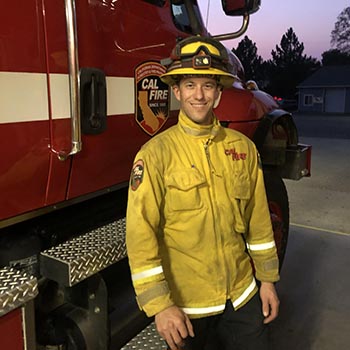Campus News
In the line of fire
Alumnus Adam Lowdermilk had built a career as a musician, but the tragic 2018 Camp Fire prompted a change of heart and a leap into firefighting.

It was November 2018, and professional musician Adam Lowdermilk (College Nine ’09, economics/jazz minor) was in Sweden when he saw TV footage of flames from the infamous Camp Fire tearing through the town of Paradise, Calif.
Lowdermilk—who grew up in San Diego where summer brush fires regularly blazed and who lived in Oakland near the Ghost Ship artists’ collective, which burned down in 2016, killing 36 people—said he felt “an almost visceral pull” to help those in the path of an inferno that would go on to leave 85 people dead and more than 18,000 structures destroyed.
The problem was, he had no experience or training in firefighting.
Fast forward to today, and Lowdermilk’s life of recording studios and late-night gigs has been replaced by firehouses and early-morning medical-aid calls. Two months ago, he was hired as a firefighter by the California Department of Forestry and Fire Protection (Cal Fire) and assigned to a stationhouse in Sutter Creek near Sacramento, where he is now poised to battle some of the worst fires ever to hit California.
“It seemed like fire was always encroaching in my life, and it was becoming a bigger problem in the state,” said the 33-year-old Lowdermilk, who is also a backpacker, climber, and surfer. Becoming a firefighter “was a combination of wanting to help others and to preserve wildlife and nature for others and for future generations.”
Lowdermilk fell in love with music as a child. He first played violin and piano and then picked up the electric bass in high school. Soon, he was playing in punk rock bands and stepping into the jazz world. At UC Santa Cruz, Lowdermilk’s passion for jazz grew. Mentored by Music Lecturer Stan Poplin, Lowdermilk played in the campus jazz and big bands and in small combos. He went on to get an MFA in music performance from Mills College.
“It was a formative time. It solidified my love for jazz,” Lowdermilk said of his time at UC Santa Cruz. For 12 years, he made a good living playing music: jazz, funk, Afro-Cuban, and West African styles with various bands and music luminaries in the Bay Area, including jazz great Roscoe Mitchell.
The Camp Fire changed his path.
As soon as he returned home from Sweden, Lowdermilk said, he signed up for an EMT and fire science courses at Merritt College. Later, he was accepted into Chabot College’s firefighter academy, which was six months of six-days-a-week training. On his one day off, he worked as an EMT for an ambulance company to get more experience. A month after he completed his training, Cal Fire hired him.
While many might not see a connection between music and firefighting, Lowdermilk does.
“There is so much of being a creative person that is transferable to fire service,” he said by phone during a recent lunch break at the fire station. “There are so many things you face on a daily basis that are unpredictable and require creative solutions and being able to think quickly. The element of improvisation in music translates well into my work now.”
Lowdermilk said he hadn’t yet been rotated onto any of the fire lines for California’s mega blazes but remained at the station to handle everyday calls from vegetation and structure fires to vehicle fires, traffic collisions, and medical emergencies. That situation could change at any moment, however.
“You have to be flexible from day to day,” he said.
Lowdermilk still plays music—mostly at home—but he knows he made the right decision to switch careers. Recently, he was awakened in the middle of the night to respond to a brush fire that was threatening nearby structures. As he and his fellow firefighters were setting up hose lines to the blaze, he slid down a steep embankment and found himself in the middle of chest-high flames and billowing smoke.
“I literally awoke from a dream in the middle of the night and it hit me right then,” Lowdermilk said. “There I was right in the belly of the beast that had initially sparked me to get involved in this. I’d gotten exactly where I’d strived to be and where I was meant to be.”